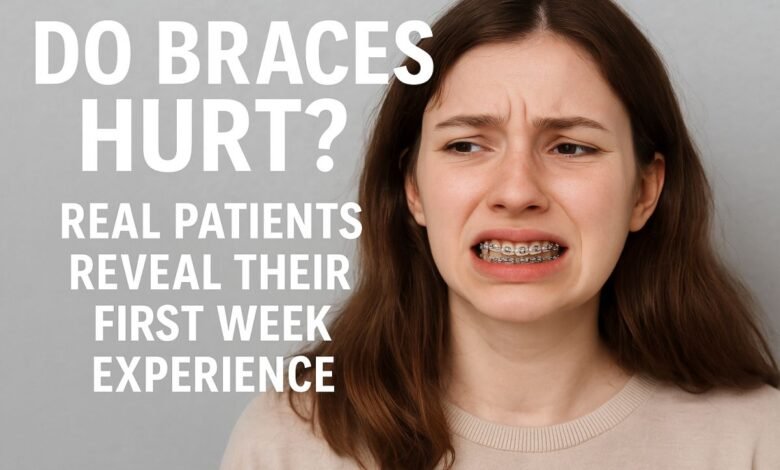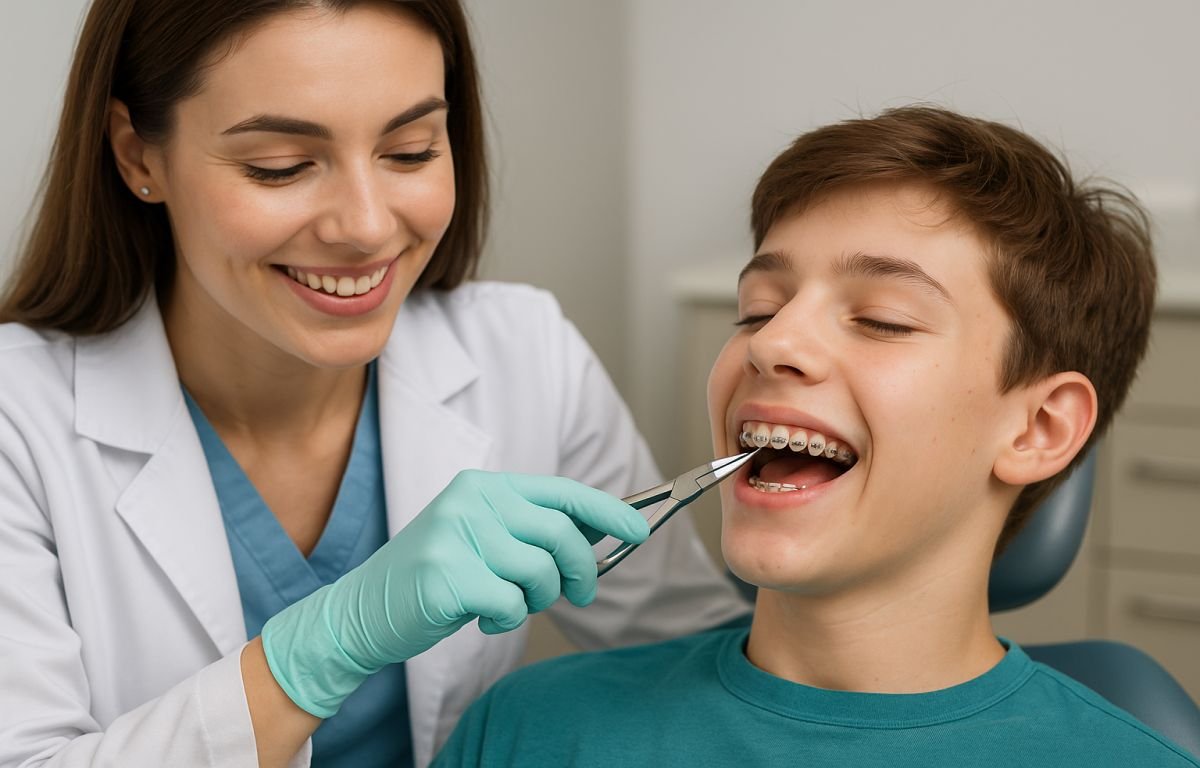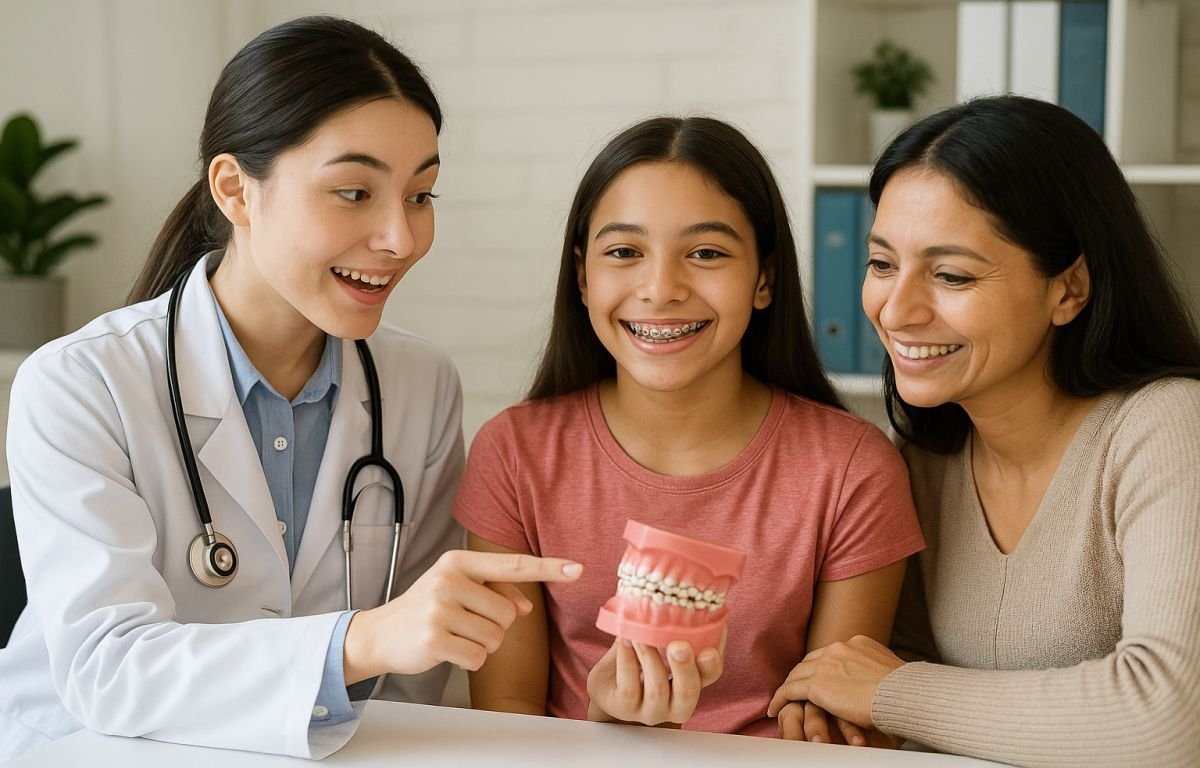Do Braces Hurt? Real Patients Reveal Their First Week Experience

Do Braces Hurt? A Comprehensive Overview of the Ordeal During Treatment
The Inter-relationship of Braces and Pain
When it comes to the decision whether or not to get braces, one of the first questions that often comes to mind is – “Do braces hurt?” Braces are the most widely used and effective orthodontic appliance to straighten teeth, correct bite issues and improve the overall appearance and health of a smile. But concern about wearing braces, and its associated pain during the treatment is one of the most frequent complaints.
The idea that braces are painful may deter some people from seeking treatment, but pain is often normal (but rarely long-lasting) with many orthodontic applications. The purpose of this article is to address the question, “Do braces hurt?” and give a you and an idea of the pain of having braces, how long it hurts, and a few ways to try and deal with it while getting treatment.
What Are Braces?

What are Braces’ Braces are devices that orthodontists use to correct misalignment of teeth and support proper positioning of the teeth. They are made of metal or ceramic brackets, wires and rubber bands that move the teeth into place over time. Braces have to be worn for 12-36 months depending on the severity of the dental issue.
Bettering ones self using braces and having perfect smile is accompany with the pain and discomfort during the initial session. With any type of medical or dental procedure, the growing apprehension over pain and braces pain will come into play. Here, we examine pain with braces and common misconceptions about it.
Do Braces hurt
Symptoms often first appear when the braces are put on and include discomfort during toothbrushing, bonding, and application of brackets. All three have their rafts of discomfort, particularly the positioning of brackets on the teeth since nobody gives a fig when bonding is applied. Therefore, it is normal to experience some soreness when the braces are put on.
Following the application of the braces, soreness can be expected in the days to weeks following. As the braces use that light an is normally a little bit of soreness an acquire but it just does not have the intensity patientd anticipate. The pain will begin to feel dulled in the days to come.
Why Braces in Particular Hurt?
Braces do hurt, however, not the braces themselves but the pressure they put on your teeth, that cause you pain. As the braces are adjusted, there is a certain amount of movement in your teeth, and they are slowly moved into a more desirable position. It’s this shifting of teeth that is accompanied by the restructuring of the surrounding bone, that often causes pain. The “discomfort” is owed to the adjustment of your teeth/wire over time, and not from the braces.

Do Braces Hurt, Or Are Teeth Sore? ALMOST A THREE – FOUR DAY LULL AFTER ADJUSTMENT.
The week after the move is the most painful week for 90% of people with braces. There’s only a little bit of discomfort for a day or two after the dentist does one or more of these three steps: new wire, tightening the braces and every once in a while, there are new elastic bands or other accoutrements. These actions help to keep the patient’s teeth active and treatment on schedule.
There is often some pain after the update, which, yes can and does cause some pain and tenderness of the gums/teeth. This pain is lurking and depending on how warm can last between 2 and 4 days. This is most commonly described as being analogous to a is to a dull ache or pressure in one’s oral cavity. The pain can, nonetheless, differ from person to person but generally depends on the extent of tightening performed and the amount of discomfort experienced by the person.
How Long Does the Pain Last?
While the question ‘do braces hurt’ is often asked, your misery will only last for short periods, especially in the initial weeks after putting on. For the majority, soreness during an adjustment, will fade after a couple of days. As the mouth and teeth adapt to the changing pressures, soreness should diminish. A more common amount of discomfort should be noticeable for around one week after the braces are adjusted.
Coping with the pain: How to beat discomfort

Helping with the pain, particularly during adjustments, reduces the difficulty of moving braces and so reduces what needs to moved – do braces hurt is still a worthwhile question. Below are some of the tips and tricks that you will likely consider to reduce pain while on corrective brace treatment:
Over-the-Counter Pain Relievers
Over-the-counter pain relievers, such as ibuprofen or acetaminophen, may also provide relief of post-adjustment discomfort. They can help ease pain during the first few days of braces adjustments. For any medication, it is critical that the dosage is precisely followed and, as always, have any pain medications to be ingested approved by the orthodontist.
Rinsing with Warm Salt Water
Swollen spots of the mouth can be controlled by a warm saltwater rinse. Mix three parts of salt with one part of baking soda in warm water so you get half a teaspoon of salt in eight ounces of warm water, gargle and swish in your mouth for around 30 seconds. This can help also to bring down swelling, heal and ease the pain in the short-term.
Gentle Foods
Soft foods are recommended for minor irritation to sore teeth and gums after braces are tightened. Mashed potatoes, yogurt, soup, and scrambled eggs are soothing and easy while you heal. Avoid hard, chewy or crunchy foods which might aggravate the pain.
Orthodontic Wax
The inside of the mouth, including cheeks, lips, and gums, can become irritated from braces. This takes place, at its worst, within the first few days of beginning to wear them. Brace wax can be helpful to relieve some of the discomfort and irritation you feel from the soft tissues rubbing against the braces. Just put a small piece of wax in your mouth, and place it in the places where the brackets don’t sit comfortable on your teeth.
Applying a Cold Compress
If you want to numb your pain and decrease swelling, place a cold compress on your cheeks or jaws. You can use ice packs or a cloth with ice on the outside of the mouth for ten to fifteen minutes.
Avoiding Said Foods
Certain foods, such as over spicy foods, acidic fruits or very hot or cold liquids can aggravate gum pain. Avoid these types of foods during the first few days immediately after your adjustment to help minimize pain and discomfort.
Brush with a Soft Bristle Tooth Brush
Gentle cleansing with a soft-bristled toothbrush may aid to ease your mouth and avoid additional pain. You will need to insure that you keep your mouth clean while you are wearing braces. By using your soft-bristle toothbrush to brush your teeth, and your braces, following every meal you can prevent a lot of irritation as well as infection.

Do Braces Hurt After the First Month?
The majority of the people find that the greatest pain comes within the first month after they have given a brace. This is the time when the mouth is adjusting to the new device and the tension on the braces are at its maximum. Acute Soreness at this time you may have some discomfort chewing or opening the jaw.
However, the pain during the subsequent month will be much less. The mouth is accustomed to the braces and the tension on the teeth is not as much anymore. Pain is mild and is borne easily by most people within a few weeks.
Other Things that can be Painful with Braces
While the adjustment of the first and the expansion of teeth during the period of treatment with braces of orthodontists are essential, other factors may also be responsible for pain during the treatment with braces.
Mouth Sores
Mouthsores for those with braces. The brackets and wires of your braces can cause irritation to your lips, cheeks, and gums in the first few weeks. You may use orthodontic wax to apply on the brackets and a saline rinse for the mouth to promote healing.
Changes in Bite
One of the earliest ways moving teeth can affect you is change in bite as the teeth go from one position to another. This can be a bit uncomfortable as your teeth adjust to their new positions. The slight soreness will disappear altogether when your teeth have finally adjusted to the new configuration.
Jaw Pain
Those who suffer from an overbite or other form of misaligned teeth may also experience jaw pain. One other reason you can have this discomfort is because of shifting teeth. Pain you feel in your jaw is usually short-term. Yeah, it is not but I’d rather not get comfortable with something like jaw pain that lasts long term. In such cases, a consultation with an orthodontist is strongly advised.
Pain Prevention Before Braces
The first question most people ask is “do braces hurt?” Well, before the braces even go on, there are lots of ways you can help ease pain and discomfort months before the event.
Desensitize Your Mouth: Your mouth aches when you wear braces, but if you wear braces before it aches, it will ache a whole lot less. So before you get your braces, eat soft foods, brush gently around your gums.
Open Up About Your Pain Fears: Bring any concerns you have about pain with you to your orthodontist. It’s just that doing so allows for recommendations that are custom-fit to make your experience better. Consider Methods to Minimize Pain: Some orthopedists may use by using numbing gels and other analgesic treatments to help counter the discomfort that comes with wearing the brace.

How Expensive Are Braces? Find Out What You’ll Really Pay for That Smile!
What are Symptoms Associated with the Need for Early Intervention?
Pain associated with braces, So pain with braces is normal Yes bracesshould be expected to be painful but there are a few specific cases that may mean the pain is not all to do with the bracess. These are: severe pain that is not resolving over a period of time with a culturally appropriate interval of return, swelling and occurrence of bleeding, and some signs of infection. These need to be reported to the orthodontist immediately by the patient.
Prolonged Discomfort
It should be enough to see consistency in the pattern of treatment if pain last any longer than two days, post adjustment/braces and an issue that may need addressing is present. When this happens, patients should get in touch with their orthodontist to learn the cause of irritation.
Irritation, infection, and associated symptoms
Patients who experience painful sores, swelling, or infection not associated with normal discomfort should contact the orthodontist right away. They are best able to address issues of infection control, management of irritations, and infection.

Conclusion: Do Braces Inflict Pain? Causes of Pain and Its Relief
So in summary of the question, “do braces hurt?” There is, of course, pain that accompanies waxing, but It’s not the same kind of pain as you would get from a more-intense-no-pain-no-gain method. This pressure causes discomfort, which braces create over time in order to move the teeth to the correct position. Although soreness is normal, the pain associated pain is bearable and disappears almost completely within a few days after being adjusted.
Furthermore, good placement of breathers such as following recommended means of pain relief, and maintaining good oral hygiene and elimination of bad hygiene habits will also increase comfort. Just remember that for a short period of time the pain will go away and after all with a brand new smile………….it would be worth the pain a beauty to smile big.
If pain is an issue for you, be sure to discuss it with your orthodentist. They would provide more customized custom tailored items, Suggestions on dental relief pain alone, and they have custom tailored their solutions to make sure that orthodontic experience is as comfy and pain free as possible.



